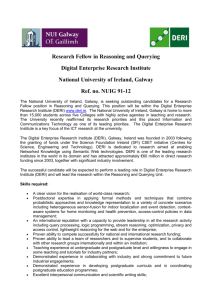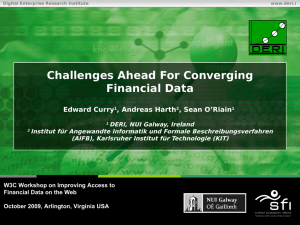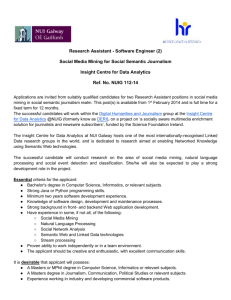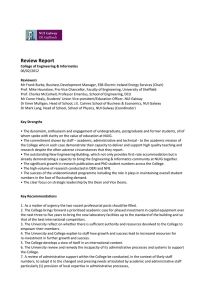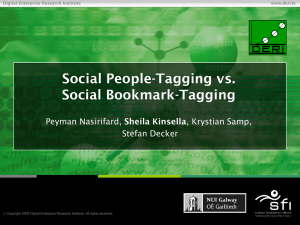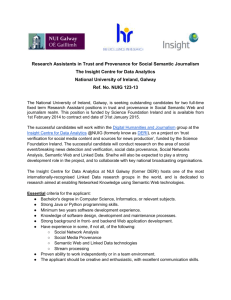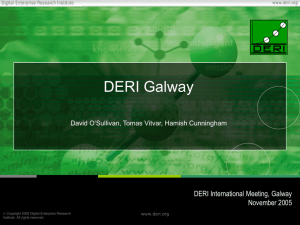Review of Digital Enterprise Research Institute DERI The Academic Quality Assurance Programme 20082009
advertisement
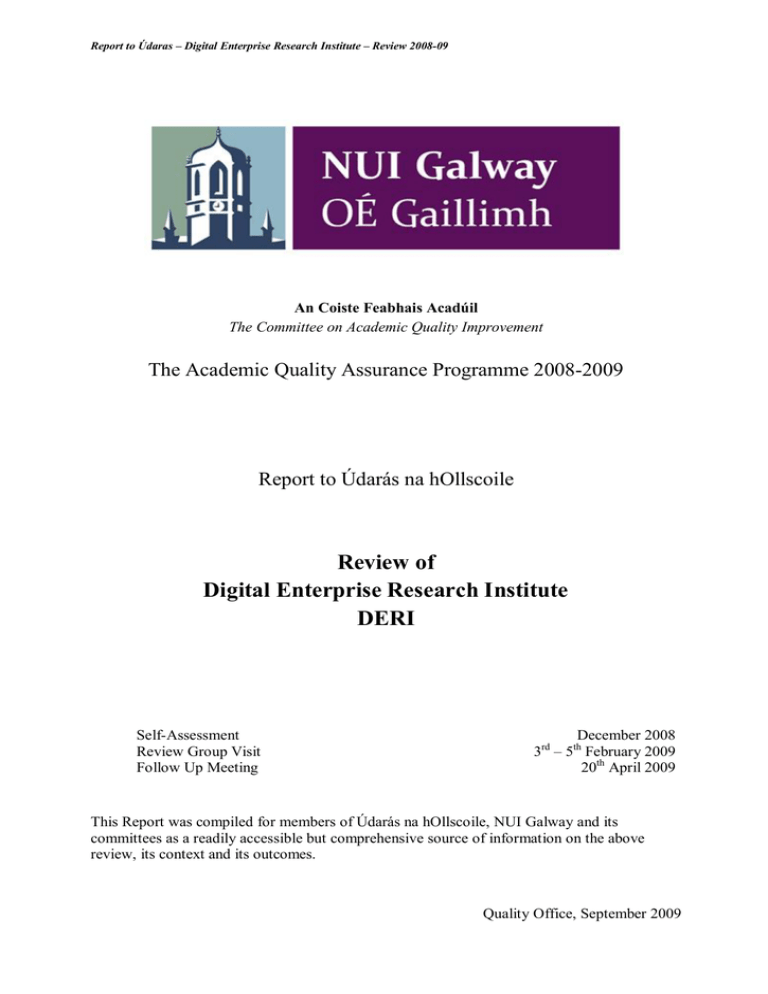
Report to Údaras – Digital Enterprise Research Institute – Review 2008­09 An Coiste Feabhais Acadúil The Committee on Academic Quality Improvement The Academic Quality Assurance Programme 2008­2009 Report to Údarás na hOllscoile Review of Digital Enterprise Research Institute DERI Self­Assessment Review Group Visit Follow Up Meeting December 2008 3 – 5 February 2009 20 th April 2009 rd th This Report was compiled for members of Údarás na hOllscoile, NUI Galway and its committees as a readily accessible but comprehensive source of information on the above review, its context and its outcomes. Quality Office, September 2009 Report to Údaras – Review of Digital Enterprise Research Board 2008­09 2 Overview of the Institute 1.1 Mission and Vision DERI’s mission is: “To exploit semantics for people, organisations and systems to collaborate and interoperate on a global scale” The vision of DERI is to be: “Recognised as the leading international web science research institute interlinking technologies, informationand people to advance business and benefit society” 1.2 Objectives Priority Leadership in Research Strategic Objectives 1. Be internationally recognised as the leading research institute in our areas of expertise Research Collaboration 2. Strengthen existing and develop new networks of research organisations to facilitate collaboration Industrial Partnerships 3. Develop and grow our business development activities and commercialization opportunities University Partnership 4. Explore opportunities for further collaboration with NUIG on common goals Best Staff & Students 5. Provide a stimulating environment that attracts, values, develops and retains high quality staff and students Sustainable Funding 6. Grow and diversify our funding to sustain the long­term development of the Institute Enhanced Profile 7. Develop our national and international profile to attract staff, funding, industry and research partners Expanded Outreach 8. Develop and grow our education and outreach activities to benefit society 1.3 Plans This section outlines the actions to be taken by DERI in order to successfully implement the strategy. The action plan outlines a number of actions under each strategic objective. Leadership in Strategic Objective 1: Be internationally recognised as the leading research institute in our areas of expertise Research Action 1.1 Identify and pursue frontier research areas 1.2 Define and implement DERI’s critical mass in terms of scope, infrastructure, staff and funding 1.3 Increase number and quality of research outputs 1.4 Establish de facto standards on the web and be a leader or key contributor to international standards working groups 1.5 Develop and implement a set of Research Performance Indicators to measure excellence and benchmark DERI against competitors Research Collaboration Strategic Objective 2: Strengthen existing and develop new networks of research organisations to facilitate collaboration Action Report to Údaras – Review of Digital Enterprise Research Board 2008­09 3 2.1 Leverage DERI’s relationships and branding nationally and internationally 2.2 Identify and develop partnerships with national and international research 2.3 Develop a framework for managing and evaluating collaborations to ensure that they contribute to the achievement of DERI’s strategic objectives Industry Collaboration Strategic Objective 3: Develop and grow our business development activities and commercialisation opportunities Action 3.1 Develop a framework to identify, manage and evaluate business development opportunities 3.2 Define the delivery of services, to bridge the gap between the boundaries of DERI research and industry development, and implement through DERI and/ or partners 3.3 Grow industrial partnerships through an enhanced engagement model e.g. new services, DERI Club 3.4 Create an eco­system (DERILAND) to connect DERI, funders, industry and solution providers to identify and exploit mutual University Partnership Strategic Objective 4: Explore opportunities for further collaboration with NUIG on common goals Action 4.1 Review participation in teaching and other NUIG academic activities 4.2 Work with NUIG to define DERI’s role in the delivery of the University research strategy 4.3 Identify and deliver on opportunities with other research organisations within the University 4.4 Review post­graduate programmes with NUIG to increase throughput numbers within the University 4.5 Work with the University to enhance the research reputation of NUIG and DERI Best Staff & Students Strategic Objective 5: Provide a stimulating environment that attracts, values, develops and retains high quality staff and students Action 5.1 Develop an attractive total package to assist in staff recruitment and retention 5.2 Develop and implement structured career paths for all staff, providing the opportunities for researchers to combine academic careers with exposure to industrial challenges 5.3 Provide appropriate infrastructural, operational and administrative support to all staff 5.4 Review and implement a formal performance management rewards and recognition programme to encourage excellence and the attainment of DERI’s strategic objectives 5.5 Ensure appropriate staffing in place to provide quality supervisory and research guidance services to PhD and post­doctoral students Sustainable Funding Strategic Objective 6: Grow and diversify our funding to sustain the long­term development of the Institute Report to Údaras – Review of Digital Enterprise Research Board 2008­09 4 Action 6.1 Identify the type and quantity of funding required to help DERI to achieve critical mass 6.2 Develop a framework to identify and evaluate opportunities and secure funding 6.3 Implement a model for core funding to ensure the sustainability of the Institute Enhanced Profile Strategic Objective 7: Develop our national and international profile to attract staff, funding, industry and research partners Action 7.1 Develop and execute a corporate marketing & PR plan 7.2 Deploy DERI Ambassador role with key responsibility to increase DERI profile 7.3 Leverage international DERI branding and other collaborations 7.4 Develop expanded Outreach programme 7.5 Review and strengthen relationships with key stakeholders, including funders, partners and sponsors Expanded Outreach Strategic Objective 8: Develop and grow our education and outreach activities to benefit society Action 8.1 Develop an expanded outreach programme to include industry, national and international activities 8.2 Encourage individuals to engage with society in novel ways through tools that enable greater access to: Local, national and EU government Environmental protection agencies Health and education resources Employment opportunities Local community building Report to Údaras – Digital Enterprise Research Institute – Review 2008­09 5 1.4 Progress Since its inception, the DERI SFI CSET grant (€12 million) has been critical in developing DERI as an internationally recognised research institute. Developments at DERI have also been enabled and facilitated through the support and backing of NUI Galway’s University Management Team. DERI has grown to over 120 members over the past 5 years and has been highly successful to date in recruiting and producing high calibre researchers. DERI has led and published at the best conferences in its field. It has also developed technology that attracts industry partnerships within Ireland and from abroad. Some examples of achievements to date are provided below. Academia: Since its inception DERI has produced over 379 research publications. Standards: DERI combines the continuous output of high quality academic publications, with active involvement in nine standardisation working groups around the world. · W3C SAWSDL WG (Semantic Annotations for WSDL) · W3C RIF WG (Rule Interchange Format · W3C Multimedia Semantics Incubator Group · W3C SWS­Testbed XG (Testbed Incubator Group) · W3C Semantic Web Deployment Working Group · W3C Semantic Web Education and Outreach (SWEO) Interest Group · OASIS Semantic Execution Environment (SEE) Technical Committee. · OASIS SOA Reference Model (SOA RM) TC The OASIS Service Oriented Architecture TC · OASIS Web Services Quality Model (WSQM) TC Recently DERI has developed the Semantically­Interlinked Online Communities (SIOC) specification for connecting online communities, which it has submitted to the World Wide Web (W3C) Consortium (the Web standards organisation) as an acknowledged member submission. DERI’s work in standards represents a key area of leadership for the institute. Research Prototypes and Technologies: To date DERI has developed a number of research prototypes, which provide the basis for commercial exploitation. Major prototypes include: · The Semantic Web Search Engine · JeromeDL: The Semantic Digital Library · Sindice – a Semantic Indexing Engine · FOAF­Realm – a Semantic Social Networking implementation · Notitious – Semantic Social Bookmarking · SIOC tools and browsers · WSMO – Web Services Modelling Ontology · WSMX – Semantic Web Services Execution Environment · Analysts Workbench · ActiveRDF Commercial Exploitation: Current projects with industry include collaborations with companies such as Storm, Nortel, Cisco, IBM and Ericsson. One notable collaboration to date has been DERI’s eLearning project (‘eLite’), funded by Enterprise Ireland, involving eight indigenous Irish eLearning companies. Report to Údaras – Digital Enterprise Research Institute – Review 2008­09 6 Funding: DERI have been very successful in attracting funding from diverse sources. To date a total of €12 million in additional funding has been secured from sources such as the European Union, Enterprise Ireland, Higher Education Authority, Irish Research Council for Science, Engineering and Technology (IRCSET), and corporate funding. This level of funding matches that provided by the SFI grant. International networks: DERI has nurtured international collaborative networks in priority areas of research, for example with DERI Stanford and DERI Seoul, as well as collaborations with prestigious universities such as University of Southampton, UK or Ecole Polytéchnique Fédérale de Lausanne (EPFL), Switzerland. Education and Outreach: To date DERI’s Education and Community Outreach programme has concentrated on developing an “Online Galway Accessible to All”. DERI’s Outreach personnel, projects, courses and guides have won numerous awards including National Heritage Week and an ITAG Schools Award. Postgraduate students: DERI currently has 56 post­graduate students (48 PhD students and 8 Masters students). Since its foundation in 2003, DERI has rapidly increased its number of post­graduates ­ the current number is three times the number registered in 2004. In the same period, DERI has rapidly increased the number of post­doctoral researchers capable of supervising students. To date DERI has produced 2 PhD and 5 Masters graduates and the next 6 months will see at least 5 PhD theses being submitted for examination. DERI’s graduate research programme has recently been refined to produce a structured research programme where students can achieve an optimal research results in the 4 years of the PhD programme. Review Group Visit and Report This report arises from a visit by a review team to the Digital Enterprise Research Institute (DERI) from 3 rd ­5 th February, 2009. The review team consisted of: · Professor Grigorios Antoniou, Institute of Computer Science, Foundation for Research and Technology Hellas (FORTH), PO Box 1385, Heraklion, Crete, GR­71110, Greece (Chair) · Professor Orla Feely, School of Electrical, Electronic and Mechanical Engineering, University College Dublin (UCD) · Dr Brian Hughes, Director of the Centre for Research on Occupational and Life Stress (CROLS), NUI Galway acting as Cognate · Dr Martina Prendergast, Development Manager of the Environmental Change Institute, NUI Galway acting as Rapporteur. Report to Údaras – Digital Enterprise Research Institute – Review 2008­09 2.1 Summary The panel were convinced that DERI is working at the cutting edge of research in semantics and web science. The Institute has come through a period of uncertainty in the early stages of its evolution, but is now recognised as one of the world leaders in the area of Semantic Web and Semantic Web Services. The Institute has clear management strengths, and is effectively run and organized. The main issues which arose during the course of the review relate to integration, supervision, and sustainability. A summary of the main issues include: · Impressive growth despite the difficulties in the initial stages of establishment · Excellent research, international leader in the area of semantic web and semantic web services · Well managed, professional operation · All staff pulling together in the same direction, high respect for managers · Good working environment and collegiate atmosphere · Excellent track record in attracting research funding allowing DERI to be self­sustaining · State­of­the­art equipment and facilities · Strong industry collaboration and relevance · Research staff have access to excellent international networks 2.2 Recommendations The following recommendations are meant to improve some aspects BUT we would warn against changes, particularly those of an administrative nature that might endanger the success so far. Recommendation 1: The management structure should be revisited and modified to include a clear conflict resolution policy within DERI. Recommendation 2: A strategy for increasing engagement (from within and perhaps beyond NUI Galway) with academic staff should be developed. This strategy might incorporate incentives (such as teaching relief or credit toward promotion) for participating in major DERI operations, subject to relevant University career­development policies. As a follow­on from DERI's strategic planning exercise for the period 2008­2013, it should prepare an outline sustainability plan for the 10­15 year horizon, considering best­case, expected and worst­case scenarios for support within NUI Galway and from external sources. Recommendation 3: The operation of the new PhD regulations for DERI should be reviewed after 18­24 months by a small group that includes a nominee of the Dean of Engineering and Informatics. The review should include a survey similar to that conducted in June 2008. Recommendation 4(a): The Postgraduate Research Committees (PRCs) within DERI should each contain at least one professor (cf., University Guidelines, Sect. 4.1). Recommendation 4(b): All first­time PhD supervisors must receive training on student supervision and project management (cf., University Guidelines, Sect. 5). Recommendation 5: DERI should work with other units in the University, under the auspices of the Office of the Dean of Graduate Studies, to assist in the development of modules in areas such as project management and entrepreneurship. These will then form part of structured PhD programmes. Report to Údaras – Digital Enterprise Research Institute – Review 2008­09 8 Recommendation 6: DERI should seriously consider the establishment of a Masters programme, in close cooperation with the College of Engineering and Informatics and other University units. Such a step should be planned with the view of reducing the dependency on external competitive research funding. The University should consider how such a move could be supported in terms of the allocation of appropriate financial and human resources. Recommendation 7: DERI should improve its publication record in leading international journals Overall, DERI is an international research leader in the area of semantic web technologies, well placed to shape the future of this field, both scientifically and technologically. In this report, we have tried to analyses its operation and performance, and outlined a number of recommendations for further improvements. However, any significant changes of strategic importance need to be carefully studied and planned so that they do not jeopardise the success story DERI has achieved so far. 3. Action Plans National University of Ireland, Galway An Coiste Feabhais Acadúil Academic Review Programme 2008 – 2009 Digital Enterprise Research Institute (DERI) Follow Up Meeting Monday, 20 th April 2009 First Floor Conference Room, DERI Building, IDA Business Park, Dangan Present: Professor James A Houghton (Chair), Professor James Ward, Registrar, Dr Iain MacLabhrainn, Director of CELT, Dr Martina Prendergast, Review Group Rapporteur, Dr Brian Hughes, Review Group Cognate, Ms Carmel Browne, Assistant Director of Human Resources, Dr Peter Corcoran, representing the Dean of Engineering and Informatics, Professor Terry Smith, Vice President for Research, Dr Brian Wall, Mr Michael Turley, Dr Conor Hayes, Professor Stefan Decker, Mr Sean O’Riain, Dr Marco Zuniga, Mr Gerard Conneely, Dr Axel Polleres, Ms Claire Browne, Ms Hilda Fitzpatrick, Ms Michelle Treacy, Ms Maria Smyth, Dr Paul Buitelaar, Dr Sami Bhiri, Ms Maureen Linnane (in attendance) Action Plan for the Director and DERI: 1. In the context of the discussions which are currently taking place and which include the participation of the President, the management structure within DERI will be examined and modified so as to include a clear conflict resolution policy that will involve, when appropriate, the participation of the HR Office. This will be concluded before the end of March 2010. Report to Údaras – Digital Enterprise Research Institute – Review 2008­09 9 2. The Senior Executive Committee (SEC) will consider ‘personalising’ some of the strategic objectives relating to DERI in order to make key objectives and priorities more specific to DERI. These will be available for implementation by March 2010. 3. As part of its overall strategy, DERI will formulate and implement, a number of initiatives to increase engagement with relevant academic staff in NUI Galway. Such initiatives will include: § Targeting PRTLI submissions as a mechanism for closer engagement § Strengthening relations within the College of Engineering and Informatics through co­participation in proposals and increased delivery of web science lectures. 4. The Senior Executive Committee (SEC) will develop a draft sustainability plan for the medium to long term. This will describe the dependency of DERI on funding agencies and will outline the best­, expected­ and worst­case scenarios for support within NUI Galway and from external sources. The plan will be collated by the SEC for discussion, input and approval by all DERI stakeholders by March 2010. 5. Following a survey of DERI postgraduate students, and in consultation with the Dean of Graduate Studies, PhD regulations will be reviewed and updated regularly by senior research staff and a nominee of the Dean of Engineering and Informatics. These new regulations will be implemented before March 2011. 6. DERI together with the Dean of Graduate Studies will endeavour to ensure that all Postgraduate Research Committees (PRCs) within DERI contain at least one Professor. If not directly involved in the specialised area of expertise being studied, the Professor may be from a cognate area. This new procedure will facilitate the greater integration of DERI within NUI Galway. 7. DERI with support from the Dean of Graduate Studies will ensure that all first­time PhD supervisors receive appropriate training on student supervision and project management. 8. Structured PhD programmes are a priority within DERI and the senior research staff will work with the Office of the Dean of Graduate Studies to assist in the development of modules in areas of project management and entrepreneurship which will then form part of structured PhD programmes. 9. Given adequate support and resources from NUI Galway, DERI, through the Senior Executive Committee (SEC), and in consultation with the Dean of Graduate Studies shall establish a structured Masters Programme. A proposal will be submitted, through the Dean of Engineering and Informatics, for approval by the relevant University authorities within the next 12 months. The responsibility for implementing this programme will be assigned within DERI and will be coordinated between researchers in the Institute, in close cooperation with the College of Engineering and Informatics, the Dean of Graduate Studies and other relevant University units. 10. Journal papers are recognised as an important metric in DERI and senior researchers will propose a list of appropriate leading international journals it wishes to target. DERI has already set goals with regard to the number of articles it wishes to produce (with a minimum target of 10 annually) over the coming 4 years. DERI staff will also work Report to Údaras – Digital Enterprise Research Institute – Review 2008­09 10 together with other academic staff in the University to further advance the number of publications. Action Plan for the School and College of Engineering and Informatics: 1. The Dean and Head of School will work closely with DERI to develop a strategy that will facilitate increased engagement with staff within the College and University. This strategy will include the involvement of academic staff from that College in teaching postgraduate students and working along with DERI to review and update PhD regulations within the Institute. These revised regulations will be implemented before March 2011. 2. The Dean and Head of School will fully support and advise DERI on how to rapidly advance towards a full time Masters Programme in the Institute. Action Plan for University Management: 1. The Registrar and Deputy President and the Vice President for Research will support a proposal for the establishment of a full time Masters Programme in DERI. This will help further embed DERI into the University and may also facilitate the approval of additional academic appointments. Support, in terms of the allocation of appropriate financial and human resources, will be considered. 2. As a consequence of the current geographical location of DERI, it was generally perceived that there was some degree of isolation from University affairs. The UMT must take measures to integrate DERI and its staff more fully into the life and activities of the University These measures will include: · Investigating, in consultation with the Buildings Office, the possibility of providing dedicated car parking space on campus for the staff of DERI. · Providing a better flow of information between DERI and the University by including, as appropriate, staff and PhD students of DERI on University working groups and committees etc. 3. DERI has only a limited number of permanent staff. Taking into account the current economic climate, the Deans of the Colleges of Engineering and Informatics, Science and Business, Public Policy and Law will meet with DERI to discuss the prospects of new appointments in specialised subjects and key specific areas associated with DERI. The objective is to enable the Institute to be more firmly embedded within NUI Galway academic systems and structures. They will also discuss how to facilitate existing NUI academic staff to become more engaged in funding acquisition and subsequent research activities. Report to Údaras – Digital Enterprise Research Institute – Review 2008­09 11 4. The University Management Team will formulate incentives for existing academic staff, such as teaching relief or credit towards promotion, to participate in major DERI operations. These incentives will be conditional on the application of: · relevant University career­development policies · policies that are applicable to all staff · The Workload Model Approved by: Director, Professor Stefan Decker, 23 rd June 2009 Approved by: Head of School and Dean of Engineering and Informatics, Professor Padraic O’Donoghue, 21 st August 2009 Approved by: Dean of Science, Dr Gerry Morgan, 30th June 2009 Approved by: Dean of Business, Public Policy and Law, Dr William Golden, 26 th June 2009 Approved by: Dean of Graduate Studies, Dr Pat Morgan, 3 rd September 2009 Approved by: Registrar, Professor Jim Ward, 12 th August 2009 Approved by: Vice President for Research, Professor Terry Smith, 26th June 2009 Approved by: Vice President for Physical Resources, Mr Keith Warnock, 18 th August 2009 Approved by: The Secretary, Dr Séamus MacMathúna, 25 Meitheamh 2009 Approved by: Director of CELT, Dr. Iain MacLabhrainn, 31 st August 2009 Approved by: Director of Human Resources, Mr Chris McNairney, 12 th August 2009 Approved by: VP for the Student Experience, Ms Mary O’Riordan, 9 th July 2009 Professor James A Houghton Director of Quality Finalised: 11 th September 2009
